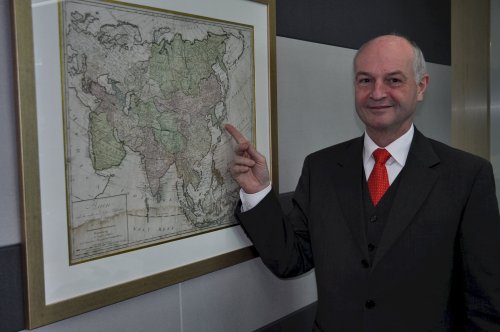During the past 30 years of the Korea German Chamber of Commerce and Industry’s existence, South Korea and the Chamber have risen from being small players to become power houses.
“It’s amazing the speed with which this country is taking up new developments, not only in industry but also in culture, in food, in every respect, so it really is a trend-setting nation,” said the Chamber’s Secretary General and Executive Officer Jurgen Wohler.
As the KGCCI celebrates its 30th anniversary, Wohler reflected back to leaner days when they had about 12-15 members.
Today the numbers are much bigger. The Chamber works with 500 members and trade is forecasted to hit $25 billion for 2010.
“Germany exports more to Korea than France, United Kingdom, Spain and Italy combined,” he noted.
That’s a far cry from the handful of German companies that operated in Korea in the late 1950s and early 1960s.
Wohler noticed the growth of the country when he spent his first stint as deputy with the chamber from 1985-1987.
“In 1986, it was the first year Korea recorded a trade surplus and started paying back its debts,” he told The Korea Herald. “Until then it was one of the major debtors in the world but you could see they were doing something.”
 |
Korea German Chamber of Commerce and Industry Secretary General Jurgen Wohler points to an 18th century map. (Yoav Cerralbo/The Korea Herald) |
That “something” grouped Korea into the category of Asian tiger economies of the period with Hong Kong, Singapore and Taiwan.
When German companies first came to Korea, the nation’s GDP per capita was one of the lowest hovering at less than $200, but in 2010, Korea’s GDP rose to over $20,000, according to the 2010 International Monetary Fund figures.
Wohler attributes the change to former President Park Chung-hee “who was to some extent influenced by Germany after he visited West Germany, and West Germany was the first country to give a commercial loan to him in 1961.”
“He was very impressed by the highways in West Germany which gave him the idea to build the same thing here,” he said, “and the Germans encouraged him, without infrastructure there’s no development.”
For about 20 years the Chamber stood at roughly 300 members but in 2007 things changed and membership skyrocketed to 500 with more in sight even with the economic crisis still crippling most of the developed world.
What is happening with German investments today reflects how German companies operated during the 1997 Asian crisis.
“The number of German companies coming to Korea is increasing even with the crisis,” Wohler said. “During the first IMF crisis in 1997-98, unlike many other countries’ companies who went away, German companies increased their share here.”
The reason is simple: German companies realized they could make more money in Korea, something they did not think about when times where better.
So now, German companies are bypassing local agents and taking care of business directly. In doing so, German companies are finding a new stream of wealth.
This is where the KGCCI comes in: It is the first contact for German companies establishing or building up business in Korea.
They offer a range of services from market information to human resource services and even offer offices for rent on their premises.
But what will really increase trade for both sides will be the implementation of the Korea-European Union free trade agreement later this year.
“I’m quite sure that we will double it (trade) as soon as it is implemented,” Wohler said.
Furthermore, Germany is starting to become the place for companies to set up their European head offices.
As for investments, Germany recorded $500 million last year and Wohler predicts the same for this year.
“German companies think more long-term,” he said.
Even though the Chamber works closely with the German Embassy, it is still a business and operates that way, something that German companies appreciate and relate to, explained Wohler.
By Yoav Cerralbo (
yoav@heraldcorp.com)
